Working in a laboratory barely larger than a three-room HDB flat, three innovators have ambitious plans to reduce the reliance on animal testing in research.
In their back room lies their arsenal - human skin, which they have made from scratch.
Biotech start-up DeNova Sciences founders Tan Ming Jie, Daniel Tan and Kelvin Chong have successfully grown skin models in plates from human skin cells. The trio believe the models offer a strong and even better alternative to animal testing when it comes to chemicals and products used on the skin, as each model is identical, making the results more accurate.
When a substance is tested on an animal or a human, there might be variations that influence the results. "But for our model the cell number, the media, condition that the skin is set to grow, is kept the same. Everything is standardised to one platform," said Dr Chong, 33.
Not only will errors be minimised, it will also save mice which would otherwise have been sacrificed in the process. Dr Chong, who is familiar with performing animal tests, jokes that he sees it as a form of "redemption". The team acknowledges animal tests are still necessary in some areas of research, such as in the development of drugs where animal testing is a regulatory requirement. But they feel alternatives should be used where possible.
So they have started the ball rolling with skincare companies and currently have two cosmetic giants as clients. The team is also working with universities and other institutions on various research projects.
Dr Chong has a PhD in life sciences and Mr Tan Ming Jie has a Master of Science, both from Nanyang Technological University (NTU). They worked previously as researchers at NTU's School of Biological Sciences where they did skin- related research. During their time there, they noticed growing interest from cosmetic firms towards in-vitro skin models and decided to start a firm to meet that demand.
DeNova Sciences, a spin-off company from NTU, is currently housed at the university's Innovation Centre. It was set up in May last year with a $50,000 grant from Spring Singapore. Since then, the founders have injected a total of $200,000 into the business out of their own pockets.
So far, the company has successfully developed five skin models: pigmented skin, dry skin, normal skin, skin with cancer and adipogenic skin - meaning skin with an extra layer of fat. The scientists are now working on developing models for ageing and wrinkled skin.
In the next two to three years, they hope to create gastrointestinal tract models to test, among other things, if collagen, probiotics and other health supplements are actually absorbed into the body.
Dr Chong and Mr Tan Ming Jie, 32, are in charge of the science behind the business while Mr Daniel Tan, 28, who has a Bachelor of Science from the University of New South Wales in Australia, does the business development aspect.
Their next step is to expand into other Asian markets, including China, Taiwan, Japan and South Korea.
In the meantime, they have already started another firm that does research on collagen. "Friends ask, 'Are you crazy - two start-ups when the first one hasn't stabilised?' But... opportunities do not wait," said Mr Tan Ming Jie. "If you think it is do-able and there is a market, why not give it a shot?"

